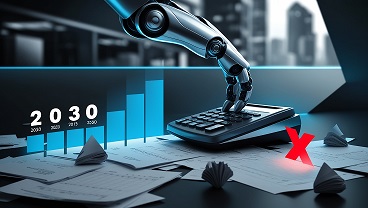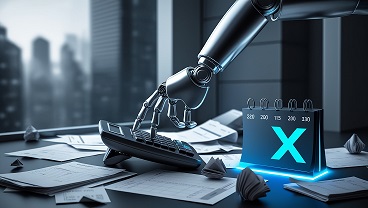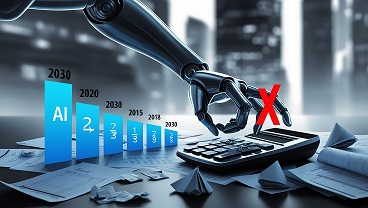Will AI Replace Accountants by 2030 What You Need to Know Now
Picture this: AI software processing thousands of transactions in seconds, automatically reconciling accounts, and generating financial reports without human intervention. 🤖 As we approach 2030, this isn't science fiction—it's becoming reality, leaving many accountants wondering: "Will I still have a job?" and Will AI Replace Accountants by 2030?
The rise of artificial intelligence in accounting has sparked both excitement and anxiety across the industry. While AI is already transforming traditional accounting tasks, the real question isn't whether AI will replace accountants entirely, but rather how the role of accounting professionals will evolve in this new technological landscape.
Let's explore the current AI revolution in accounting, examine its true impact on accounting roles, and most importantly, discover how accounting professionals can adapt and thrive in this AI-driven future. From understanding the essential skills you'll need to knowing AI's limitations, here's what every accountant needs to know about staying relevant in 2030 and beyond. 🚀

Current State of AI in Accounting
Tasks Already Automated by AI
AI has successfully automated several routine accounting functions, transforming traditional workflows. Here are the key areas where AI is already making a significant impact:
- Transaction categorization and coding
- Invoice processing and data entry
- Bank reconciliation
- Expense report processing
- Basic compliance checks
- Standard financial report generation
Areas Still Requiring Human Expertise
While AI excels at repetitive tasks, certain aspects of accounting remain firmly in human domain:
| Function | Why Human Expertise is Essential |
|---|---|
| Strategic Planning | Requires complex decision-making and business context |
| Client Relationships | Needs emotional intelligence and personalized communication |
| Complex Tax Planning | Demands interpretation of regulations and creative problem-solving |
| Audit Judgment | Requires professional skepticism and contextual understanding |
Success Stories from Early AI Adoption
Leading firms have demonstrated remarkable improvements through AI implementation:
- Deloitte's AI-powered audit tools reduced document review time by 50%
- PwC's cash flow forecasting AI increased accuracy by 30%
- Mid-sized firms report 40% reduction in manual data entry tasks
- Regional accounting practices show 25% increase in client capacity
As accounting technology continues to evolve, firms are finding new ways to leverage AI while maintaining the crucial human element. Next, we'll examine how these changes are specifically impacting various accounting roles and responsibilities.

Impact Assessment of AI on Accounting Roles
Entry-level Positions at Risk
Basic bookkeeping and data entry roles face significant disruption as AI automation excels at routine tasks. Entry-level positions most vulnerable include:
- Transaction processing clerks
- Accounts payable/receivable specialists
- Payroll administrators
- Basic compliance reporting roles
Evolution of Senior Accounting Roles
Senior accounting positions are transforming rather than disappearing. These roles now focus on:
- Strategic financial planning
- Data interpretation and analysis
- Risk assessment
- Advisory services to clients
New Job Opportunities Created by AI
The integration of AI is creating novel positions in accounting:
| New Role | Primary Responsibilities |
|---|---|
| AI Implementation Specialist | Configure and maintain accounting AI systems |
| Financial Data Scientist | Analyze complex financial patterns using AI tools |
| Automation Consultant | Design automated accounting workflows |
| AI Control Specialist | Monitor AI system accuracy and compliance |
Salary Trends and Projections
The salary landscape is shifting with AI integration:
- Traditional bookkeeping roles: 15-20% decrease expected
- AI-skilled accountants: 25-40% premium over traditional roles
- Hybrid positions combining accounting and tech skills: Up to 50% higher compensation
- Senior advisory roles: Continued growth in compensation due to increased value-add responsibilities
As accounting firms increasingly adopt AI technologies, the focus shifts to developing capabilities that complement rather than compete with automation. Let's explore the essential skills that future accountants need to thrive in this evolving landscape.

Essential Skills for Future Accountants
Data Analytics Proficiency
Modern accountants must master data analytics tools to extract meaningful insights from financial data. This includes proficiency in:
- SQL for database queries
- Python or R for data manipulation
- Visualization tools like Tableau or Power BI
- Statistical analysis techniques
AI Systems Management
Understanding and managing AI-powered accounting systems is crucial. Key competencies include:
- AI platform configuration
- Automated workflow setup
- System integration management
- Error detection and troubleshooting
Strategic Advisory Skills
As AI handles routine tasks, accountants must develop strategic thinking capabilities:
| Advisory Area | Key Focus Points |
|---|---|
| Business Growth | Market analysis, expansion strategies |
| Financial Planning | Investment decisions, risk management |
| Process Optimization | Workflow efficiency, cost reduction |
| Compliance Strategy | Regulatory adaptation, policy planning |
Risk Assessment Expertise
Modern accountants need advanced risk assessment abilities:
- Cybersecurity risk evaluation
- Compliance risk monitoring
- Financial risk modeling
- Operational risk assessment
Client Relationship Management
Strong interpersonal skills become increasingly important:
- Effective communication
- Problem-solving
- Consultative approach
- Relationship building
Now that we've outlined the essential skills, let's explore how accountants can effectively prepare for this AI transition.
- Will AI Replace Medical Coders or Revolutionize Their Roles?
- Business trends for next 10 years must know to stay competitive
Preparing for the AI Transition
Required Technical Training
- Data Analytics Tools (Python, R, SQL)
- Cloud Accounting Platforms
- AI/ML Fundamentals
- Business Intelligence Software
- RPA (Robotic Process Automation) Tools
To stay competitive, accountants must focus on acquiring technical proficiency in modern tools that complement AI systems. Start with basic programming concepts and gradually progress to more advanced data analysis capabilities.
Recommended Certifications
| Certification | Focus Area | Time Investment |
|---|---|---|
| ACCA Data Analytics | Data Analysis | 3-6 months |
| RPA Developer | Automation | 2-4 months |
| AI in Finance | Machine Learning | 4-6 months |
| Cloud Accounting | Digital Systems | 2-3 months |
Career Pivot Strategies
- Identify Current Skill Gaps
- Assess your technical competencies
- Compare with industry requirements
- Create a learning roadmap
- Build a Transition Timeline
- Set realistic milestone goals
- Allocate time for upskilling
- Network with tech-savvy professionals
- Gain Practical Experience
- Take on hybrid roles combining traditional and AI tasks
- Volunteer for automation projects
- Create a portfolio of tech-enabled accounting solutions
Focus on developing a unique blend of accounting expertise and technical skills. Consider specializing in areas where human judgment remains crucial, such as strategic financial planning or AI system auditing. Maintain professional relationships with both traditional accountants and technology specialists to broaden your perspective and opportunities.
Now that you understand how to prepare for the AI transition, let's examine the current limitations of AI in accounting to get a realistic picture of what tasks will likely remain in human hands.

Reality Check: AI Limitations in Accounting
Complex Decision-Making Challenges
While AI excels at processing data, it struggles with nuanced financial decisions that require contextual understanding. AI systems cannot fully replicate human intuition in:
- Interpreting unusual transactions
- Evaluating special circumstances
- Assessing business relationships
- Managing exceptional cases
Regulatory Compliance Issues
AI faces significant limitations in adapting to rapidly changing regulatory environments. Current systems struggle with:
| Compliance Challenge | AI Limitation |
|---|---|
| Regional Variations | Cannot automatically adapt to different jurisdictions |
| New Regulations | Requires manual updates and programming |
| Complex Interpretations | Struggles with ambiguous regulatory language |
Data Security Concerns
AI systems in accounting present unique security vulnerabilities:
- Increased exposure to cyber threats
- Data privacy compliance challenges
- Risk of algorithmic manipulation
- Potential for systematic errors
Human Judgment Requirements
Critical accounting functions still demand human oversight:
- Strategic financial planning
- Ethical decision-making
- Client relationship management
- Professional skepticism in auditing
While AI can process vast amounts of data and automate routine tasks, these limitations highlight why human accountants will remain essential. Their ability to exercise professional judgment, maintain ethical standards, and navigate complex regulatory environments cannot be fully replicated by artificial intelligence. Now, let's explore how accountants can prepare themselves for the AI transition while leveraging their uniquely human capabilities.
Conclusion
Artificial Intelligence is undoubtedly transforming the accounting profession, but rather than replacing accountants entirely, it's reshaping their roles for the better. While AI excels at automating routine tasks and data processing, the critical thinking, professional judgment, and strategic insight that accountants provide remain irreplaceable. The future belongs to accountants who embrace AI as a powerful tool while developing their strategic advisory capabilities.
To stay relevant in this evolving landscape, accountants should focus on upskilling in data analytics, AI literacy, and strategic consulting while maintaining their core accounting expertise. By viewing AI as a collaborative partner rather than a threat, accounting professionals can position themselves at the forefront of this technological revolution, delivering enhanced value to their clients and organizations well beyond 2030.
